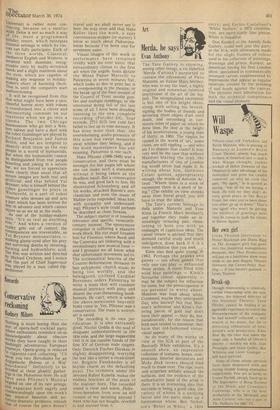keCOrdS
Conservative reckoning
Rodney Mlles Nothing is more boring than the sort of opera-buff cocktail party Where enthusiasts reminisce oh-so knowledgeably about obscure Works they, have caught in their dashingly adventurous European Journeys. Opera-going is reduced 1,13 cigarette-card collecting: "I'll 'AW01:0 you two Herodiates for an ‘es.r—ptische Helena or a Waf'enschnzied." Definitely to be voided at these ghastly gather11111gs is the Palestrina-bore. He will ave seen Pfitzner's Musical Legend on one of its rate airings, and expatiate both sagely and condescendingly upon the work's trare musical beauties and no
rious dramatic problems, remark "'at of course the piece doesn't
travel and we shall never see it here. He may even add that Hans Keller likes the work, a sure conversation-stopper (or starter). I know so much about Palestrinabores because I've been one for seventeen years.
Visual images of the work in performance have remained vividly with me ever since: that extraordinary climax to the first act when the angelic hosts dictate the Missa Papae Marcelli to Palestrina in seven minutes flat, which looks so dire in print but is so overpowering in the theatre; or the break up of the final session of the Council of Trent amidst gunfire and multiple stabbings; or the emotional dying fall of the last scene of all. I have been dreading listening to the new complete recording (Polydor-DG, four records, 2711 013) lest cold fact failed to live up to rose memory. It has done more than that: the overwhelming audio-presence of this score has swept memories away whither they belong, and if the word masterpiece has any meaning, Palestrina is one such.
Hans Pfitzner (1869-1949) was a conservative, and these must be amongst the few pages left where one can make such a statement without it being taken as the deadliest insult. But a conservative he was, and good luck to him. He abominated Schoenberg and all his works, attacked Busoni's neoclassicism and even the music of Mahler (who responded, bless him, with sympathy and understanding). Pfitzner's style could perhaps be described as clean Strauss.
The subject matter is ot timeless relevance and specific twentiethcentury interest. The eponymous composer is suffering a massive work-block. His star pupil forsakes him for Florence, where Bardi and the Camerata are tinkering with a revolutionary new musical form — and I presume we all know what that unfortunate movement led to. The ecclesiastical heavies of the Counter-Reformation threaten to ban polyphonic church music as being too worldly, and the beleagured, civilised Cardinal Borromeo orders Palestrina to write a mass that will combine musical intricacy with piety and disarm the ever-threatening bookburners. He can't, which is where the above-mentioned heavenly hosts come in. Yes, Pfitzner was a conservative. The mass is written, art is saved.
The recording is its own justification. It is also extremely good. Nicolai Gedda is the soul of eloquent understatement in the title role, and the large supporting cast is in the capable hands of the first XV of German male singers. Only Dietrich Fischer-Dieskau is slightly disappointing, worrying the text like a terrier a recalcitrant rat. Brigitte Fassbander is all boyish charm as the defaulting pupil. The orchestra under the devoted Rafael Kubelik realise the
endless felicities of the score to the manner born. The recorded sound is clear and warm. Palestrina-boredom from now on will consist of my berating anyone I meet who has not bought, revelled in and learned from it.


































 Previous page
Previous page